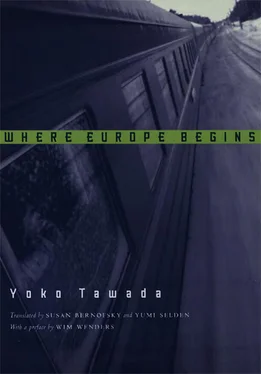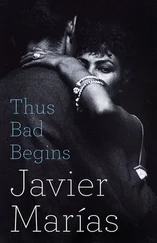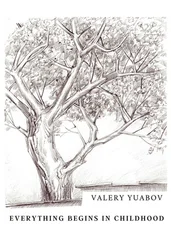When I was a little girl, I never believed there was such a thing as foreign water, for I had always thought of the globe as a sphere of water with all sorts of small and large islands swimming on it. Water had to be the same everywhere.Sometimes in sleep I heard the murmur of the water that flowed beneath the main island of Japan. The border surrounding the island was also made of water that ceaselessly beat against the shore in waves. How can one say where the place of foreign water begins when the border itself is water?
2
The crews of three Russian ships stood in uniform on the upper deck playing a farewell march whose unfamiliar solemnity all at once stirred up the oddest feelings in me. I, too, stood on the upper deck, like a theatergoer who has mistakenly stepped onstage, for my eyes were still watching me from among the crowd on the dock, while I myself stood blind and helpless on the ship. Other passengers threw long paper snakes in various colors toward the dock. The red streamers turned midair into umbilical cords — one last link between the passengers and their loved ones. The green streamers became serpents and proclaimed their warning, which would probably only be forgotten on the way, anyhow. I tossed one of the white streamers into the air. It became my memory. The crowd slowly withdrew, the music faded, and the sky grew larger behind the mainland. The moment my paper snake disintegrated, my memory ceased to function. This is why I no longer remember anything of this journey. The fifty hours aboard the ship to the harbor town in Eastern Siberia, followed by the hundred and sixty hours it took to reach Europe on the Trans-Siberian Railroad, have become a blank space in my life which can be replaced only by a written account of my journey.
3
Diary excerpt:
The ship followed the coastline northward. Soon it was dark, but many passengers still sat on the upper deck. In the distance one could see the lights of smaller ships. “The fishermen are fishing for squid,” a voice said behind me. “I don’t like squid. When I was little, we had squid for supper every third night. What about you?” another voice asked. “Yes,” a third one responded, “I ate them all the time, too. I always imagined they were descended from monsters.” “Where did you grow up?” the first voice asked.
Voices murmured all around me, tendrils gradually entwining. On board such a ship, everyone begins putting together a brief autobiography, as though he might otherwise forget who he is.
“Where are you going?” the person sitting next to me asked. “I’m on my way to Moscow.” He stared at me in surprise. “My parents spoke of this city so often I wanted to see it with my own eyes.” Had my parents really talked about Moscow? On board such a ship, everyone begins to lie. The man was looking so horrified I had to say something else right away. “Actually I’m not so interested in Moscow itself, but I want to have experienced Siberia.” “What do you want to experience in Siberia?” he asked, “What is there in Siberia?” “I don’t know yet. Maybe nothing to speak of. But the important thing for me is traveling through Siberia.” The longer I spoke, the more unsure of myself I became. He went to sit beside another passenger, leaving me alone with the transparent word through .
4
A few months before I set off on my journey, I was working evenings after school in a food processing factory. A poster advertising a trip to Europe on the Trans-Siberian Railroad transformed the immeasurably long distance to Europe into a finite sum of money.
In the factory, the air was kept at a very low temperature so the meat wouldn’t go bad. I stood in this cold, which I referred to as “Siberian frost,” wrapping frozen poultry in plastic. Beside the table stood a bucket of hot water in which I could warm my hands at intervals.
Once three frozen chickens appeared in my dreams. I watched my mother place them in the frying pan. When the pan was hot, they suddenly came to life and flew out the kitchen window. “No wonder we never have enough to eat,” I said with such viciousness even I was shocked. “What am I supposed to do?” my mother asked, weeping.
Besides earning money, there were two other things I wanted to do before my departure: learn Russian and write an account of the journey. I always wrote a travel narrative before I set off on a trip, so that during the journey I’d have something to quote from. I was often speechless when I traveled. This time it was particularly useful that I’d written my report beforehand. Otherwise, I wouldn’t have known what to say about Siberia. Of course, I might have quoted from my diary, but I have to admit that I made up the diary afterward, having neglected to keep one during the journey.
5
Excerpt from my first travel narrative:
Our ship left the Pacific and entered the Sea of Japan, which separates Japan from Eurasia. Since the remains of Siberian mammoths were discovered in Japan, there have been claims that a land bridge once linked Japan and Siberia. Presumably, human beings also crossed from Siberia to Japan. In other words, Japan was once part of Siberia.
In the Atlas of the World in the ship’s library I looked up Japan, this child of Siberia that had turned its back on its mother and was now swimming alone in the Pacific. Its body resembled that of a seahorse, which in Japanese is called Tatsu-no-otoshigo —the lost child of the dragon.
Next to the library was the dining room, which was always empty during the day. The ship rolled on the stormy seas, and the passengers stayed in bed. I stood alone in the dining room, watching plates on the table slide back and forth without being touched. All at once I realized I had been expecting this stormy day for years, since I was a child.
6
Something I told a woman three years after the journey:
At school we often had to write essays, and sometimes these included “dream descriptions.” Once I wrote about the dream in which my father had red skin.
My father comes from a family of merchants in Osaka. After World War II, he came to Tokyo with all he owned: a bundle containing, among other things, an alarm clock. This clock, which he called the “Rooster of the Revolution,” soon stopped running, but as a result, it showed the correct time twice each day, an hour that had to be returned to twice a day anyhow. “Time runs on its own, you don’t need an alarm clock for that,” he always said in defense of his broken clock, “and when the time comes, the city will be so filled with voices of the oppressed that no one will be able to hear a clock ring any longer.”
His reasons for leaving the land of his birth he always explained to his relatives in a hostile tone: “Because he was infected with the Red Plague.” These words always made me think of red, inflamed skin.
A huge square, crowds of people strolling about. Some of them had white hair, others green or gold, but all of them had red skin. When I looked closer, I saw that their skin was not inflamed but rather inscribed with red script. I was unable to read the text. No, it wasn’t a text at all but consisted of many calendars written on top of each other. I saw numberless stars in the sky. At the tip of the tower, the Fire Bird sat observing the motion in the square.
This must have been “Moscow,” I wrote in my essay, which my teacher praised without realizing I had invented the dream. But then what dream is not invented?
•
Later I learned that for a number of leftists in Western Europe this city had a different name: Peking.
7
Diary excerpt:
The ship arrived in the harbor of the small Eastern Siberian town Nachodka. The earth seemed to sway beneath my feet. No sooner had I felt the sensation of having put a border, the sea, behind me than I glimpsed the beginning of the train tracks that stretched for ten thousand kilometers.
Читать дальше












